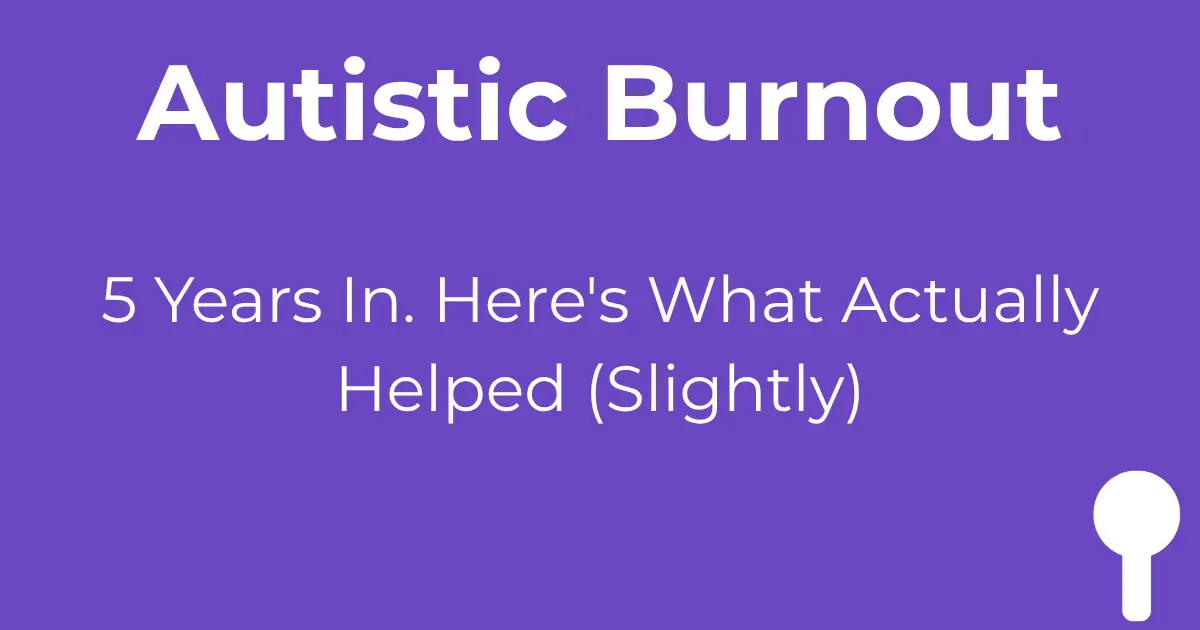
Autistic Burnout for Years: What Helped Me (Slightly)
Content note: family yelling, sensory overload, long-term burnout.
5 years ago, I hit burnout.
Multiple outbursts from my mom over minor things. Forgetting certain chores. Not mowing the lawn "properly." Her yelling and screaming at me.
The constant sensory overload from my family's loud voices and unpredictable outbursts kept me in a perpetual state of nervous system activation. I couldn't recover because the source never stopped.
For me, constant sensory stress keeps my nervous system activated. When it never stops, I don’t reset.
I'm still burned out now. 5 years later.
What I Tried First
Headphones. Intentionally not talking to family as often.
Helped a little. My family was the primary source of my autistic burnout. Living in their house meant constant exposure to the exact environmental triggers that burned me out in the first place.
But still problematic since my family forces themselves into my room all the time.
I can't recover when the source of burnout keeps happening.
The Advice That Didn't Work
Typical neurotypical advice: "Just talk things through." "Do something that makes you happy."
The issue? These problems keep recurring. They drain my energy. My special interests—drawing, animation—become more exhausting than fulfilling when I'm this drained.
"Do something fun" doesn't work when you have no energy left to enjoy it.
What Actually Helped (Slightly)
- Noise-canceling headphones (all day at home, only takes them off occasionally to prevent pressure fatique.)
- White noise machine (sleep + recovery)
- Earplugs when I can’t wear headphones
- Masking less (less eye contact, less pretending I’m fine)
These help, but barely make a dent towards helping me feel better. A mere bandaid on a wound that's still bleeding.
Where I'm At Now
Slightly better. But I have a long way to go toward recovery from autistic burnout.
Recurring drains are still ongoing. Loud stomping and conversations at home. Noise-canceling headphones and a white noise machine help slightly, but just barely.
What Tracking Showed Me
Tracking my energy allowed me to adjust my environment wherever possible. I picked up on subtle drains around my family's house and at work.
White noise machines. Earplugs. Noise-canceling headphones. Masking less—hiding my autistic traits around my family, forcing eye contact, pretending their yelling didn't affect me. Dropping some of that performance saved me energy.
I started writing down what drained me each day: yelling, stomping, unexpected interruptions, and any ‘forced conversation’ moments.
These help, but barely help in an environment that ignores your accommodations entirely.
The Reality
5 years in. Still burned out. Slightly better, but not recovered.
Recovery isn't linear. It's not fast. And it's nearly impossible when the environment that burned you out is still your daily reality.
Tracking helps me see patterns. Make small adjustments. Know what drains you most.
It won't fix systemic problems. But it shows you what I CAN control.
This is my survival blueprint—not a recovery plan, but the adjustments that keep me functional in an environment that won't accommodate me.
I'm Omari, a 23-year-old autistic adult who's been managing chronic burnout for 5+ years while working warehouse shifts.
This is why I built Spoons. To see the patterns. To manage what's manageable. And to manage environments that won't accommodate me.
Launching April 2026. getspoons.app - One email when it's ready. No spam.
— Omari
Note: I'm sharing my personal experience as an autistic adult, not medical advice. If you're experiencing severe burnout or crisis, please consult a healthcare provider familiar with autism.
